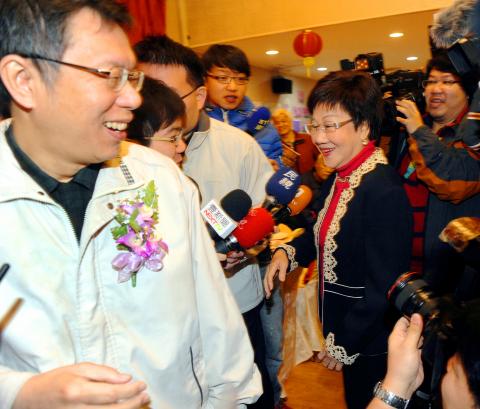Award-winning screenwriter and author Neil Peng (馮光遠) is set to officially announce his bid in the Taipei mayoral election today as an independent, further ensuring that the seven-in-one municipal elections in November are likely to be one of the most colorful campaigns in recent history.
Peng, 61, is known for political satire in his columns and blog posts, in particular against President Ma Ying-jeou (馬英九) and the Chinese Nationalist Party (KMT), as well as his one-liners, but he said his campaign would be serious, in an effort to make Taipei a better city.
“My campaign will tell people that running for public office is no longer a privilege of the rich and the powerful,” Peng said in an interview published yesterday in the Liberty Times, (the Taipei Times’ sister newspaper).

Photo: Lo Pei-der, Taipei Times
Peng’s screenplay for The Wedding Banquet (喜宴), directed by Ang Lee (李安), won best original screenplay at Taiwan’s Golden Horse Awards in 1993.
He is the cofounder of the Constitution 133 Alliance, which launched a recall campaign against KMT Legislator Wu Yu-sheng (吳育昇) in New Taipei City (新北市) in August last year.
The initiative failed earlier this month due to insufficient signatures required by law to pass the second stage of the proposal.
Peng said he has been mulling entering the race since he was sued by Ma administration officials in 2012 over accusations of his involvement in an allegedly illegal bidding process for the centennial musical Dreamers (夢想家).
“As a comedian, I’m going to make the campaign process a fun one,” Peng said, adding that “I will quickly roll out my policies on Taipei’s finance, transportation, tourism, culture, housing, child care and long-term care, among others.”
Taiwanese have to participate in politics and facilitate changes rather than criticize politicians and no place would be a better starting point than the capital, Peng said.
If the past year was described as a year of the awakening of civil movement, he said, “this year should be a year of civil participation.”
Entry into the Taipei race from Peng and National Taiwan University Hospital physician Ko Wen-je (柯文哲), who is currently the frontrunner among non-KMT hopefuls, could further complicate the already complex situation for the Democratic Progressive Party (DPP).
The pan-green camp has been in dispute over how to settle on a single candidate from among Ko and five DPP aspirants to give it a better opportunity of beating the eventual KMT candidate in the traditional KMT stronghold.
While the KMT has not finalized its nomination, the most likely candidate is said to be former Taipei EasyCard Co chairman Sean Lien (連勝文), son of former vice president Lien Chan (連戰).
Many pan-green supporters have called for the DPP not to nominate its own candidate and instead support Ko, despite the party’s statements that it is obligated by its regulations to nominate a candidate.
The DPP has been trying to work out a solution to address the political reality of Ko’s high popularity and its party aspirants’ insistence on nomination.
Meanwhile, former vice president Annette Lu (呂秀蓮), one of the contenders for the DPP nomination, yesterday denied a rumor that she might drop out of the race and enter the party chairman election, scheduled for May.

The manufacture of the remaining 28 M1A2T Abrams tanks Taiwan purchased from the US has recently been completed, and they are expected to be delivered within the next one to two months, a source said yesterday. The Ministry of National Defense is arranging cargo ships to transport the tanks to Taiwan as soon as possible, said the source, who is familiar with the matter. The estimated arrival time ranges from late this month to early next month, the source said. The 28 Abrams tanks make up the third and final batch of a total of 108 tanks, valued at about NT$40.5 billion

Travel agencies in Taiwan are working to secure alternative flights for travelers bound for New Zealand for the Lunar New Year holiday, as Air New Zealand workers are set to strike next week. The airline said that it has confirmed that the planned industrial action by its international wide-body cabin crew would go ahead on Thursday and Friday next week. While the Auckland-based carrier pledged to take reasonable measures to mitigate the impact of the workers’ strike, an Air New Zealand flight arriving at Taipei from Auckland on Thursday and another flight departing from Taipei for Auckland on Saturday would have to

A group from the Taiwanese Designers in Australia association yesterday represented Taiwan at the Midsumma Pride March in Melbourne. The march, held in the St. Kilda suburb, is the city’s largest LGBTQIA+ parade and the flagship event of the annual Midsumma Festival. It attracted more than 45,000 spectators who supported the 400 groups and 10,000 marchers that participated this year, the association said. Taiwanese Designers said they organized a team to march for Taiwan this year, joining politicians, government agencies, professionals and community organizations in showing support for LGBTQIA+ people and diverse communities. As the first country in Asia to legalize same-sex

MOTIVES QUESTIONED The PLA considers Xi’s policies toward Taiwan to be driven by personal considerations rather than military assessment, the Epoch Times reports Chinese President Xi Jinping’s (習近平) latest purge of the Chinese People’s Liberation Army (PLA) leadership might have been prompted by the military’s opposition to plans of invading Taiwan, the Epoch Times said. The Chinese military opposes waging war against Taiwan by a large consensus, putting it at odds with Xi’s vision, the Falun Gong-affiliated daily said in a report on Thursday, citing anonymous sources with insight into the PLA’s inner workings. The opposition is not the opinion of a few generals, but a widely shared view among the PLA cadre, the Epoch Times cited them as saying. “Chinese forces know full well that